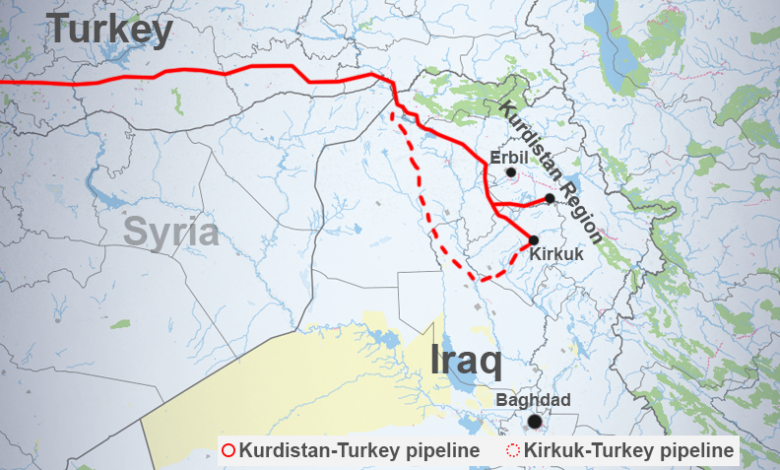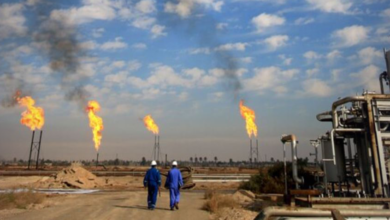
SULAIMANI, Kurdistan Region — The Iraqi government has commenced the repair of its aging oil pipeline while discontinuing the Kurdistan-Turkey pipeline, a source from the North Oil Company in Kirkuk disclosed to Zoom News. The source further indicated that 80 percent of the repair work has already been completed.
The source revealed that the Iraqi Ministry of Oil has accelerated the renovation and reconstruction of the Kirkuk-Turkey pipeline, which transports oil from the Kirkuk oil fields through the Nineveh governorate to Turkey, bypassing the Kurdistan Region’s oil pipeline.
With 80% of the repair work completed, the pipeline is poised to resume operations within the next two to three months, facilitating the transportation of oil to Turkey. Upon completion of the repairs, the pipeline will have the capacity to transport over one million barrels per day, the source added.
This recent development stems from Iraq’s unwillingness to transport its oil, along with that of the Kurdistan Region, through the Kurdistan-Turkey pipeline. The pipeline has been non-operational for nearly a year following an arbitration court ruling that has cut off the revenue source of the autonomous region.
In recent months, both the Kurdistan Regional Government (KRG) and Turkey have reiterated their readiness to recommence oil exports through the Kurdistan-Turkey pipeline. Nonetheless, Baghdad contends that despite ongoing negotiations, no agreement has been reached.
On Wednesday, the spokesperson for the KRG, Peshawa Hawramani, stated that the postponement of oil export resumption is purely a political decision and is unrelated to any technical issues.
The Kirkuk-Turkey pipeline, alternatively referred to as the Kirkuk-Ceyhan pipeline, comprises two pipes measuring 42 and 46 inches in diameter. These pipelines were constructed in 1976 and 1986, respectively.
On August 27, 1973, pursuant to an agreement between Iraq and Turkey, construction commenced on the inaugural pipeline, which was finalized after three years. Then, on May 25, 1977, Kirkuk oil was dispatched to the global market for the first time.
The Kirkuk-Ceyhan pipeline begins in northern Kirkuk and passes through Nineveh province before turning north near southern Mosul to reach Fishkhabour. From there, it continues to a station called MS on the Turkish border, then extends through Turkey and North Kurdistan to the town of Yumurtalik in the Ceyhan district of Adana province along the Mediterranean Sea. The pipeline spans 970 kilometers in total, with 350 kilometers of it running through Iraq.
In 1986, spurred by heightened oil production in Iraq, a decision was made to install an additional pipeline alongside the existing one. Consequently, the project commenced that year and was swiftly completed.
Oil exportation through this pipeline persisted until 1990. However, following the Iraqi invasion of Kuwait and the subsequent imposition of UN sanctions on Iraq, oil exports via the first pipeline were initially halted, and exports through the second pipeline were subsequently reduced by half. Eventually, the UN opted to completely suspend Iraqi oil exports via the Kirkuk-Ceyhan oil pipeline.
In 1995, a decision was made to reopen the pipeline as a component of the UN’s Oil-for-Food Programme (OIP), leading to the resumption of Iraqi oil exports through the pipeline in 1996.
This situation persisted even after the downfall of the Ba’ath regime in 2003 until 2010. However, on September 19 of the same year, Iraq and Turkey renewed their previous agreement, leading to a significant increase in Iraqi oil exports.
In early 2014, the Kirkuk-Ceyhan pipeline faced significant challenges. ISIS militants emerged and gained control over a considerable portion of Nineveh province, through which the pipeline traversed. These militants targeted and destroyed segments of the pipeline at multiple locations. As a result, the Iraqi government was compelled to halt all oil exports via the Kirkuk-Ceyhan pipeline on March 2, 2014. To date, the pipeline remains inactive, with no resumption of operations.
Following the ruling by the International Court of Arbitration in Paris on March 23, 2023, which deemed the export of oil without Baghdad’s consent illegal, oil exports from the Kurdistan Region and Kirkuk ceased. This cessation amounted to approximately 475,000 barrels per day, comprising 400,000 barrels from the Kurdistan Region and 73,000 to 75,000 barrels from Kirkuk.



